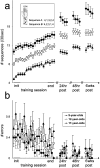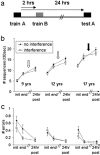Reduced susceptibility to interference in the consolidation of motor memory before adolescence
- PMID: 17327907
- PMCID: PMC1800346
- DOI: 10.1371/journal.pone.0000240
Reduced susceptibility to interference in the consolidation of motor memory before adolescence
Abstract
Are children superior to adults in consolidating procedural memory? This notion has been tied to "critical," early life periods of increased brain plasticity. Here, using a motor sequence learning task, we show, in experiment 1, that a) the rate of learning during a training session, b) the gains accrued, without additional practice, within a 24 hours post-training interval (delayed consolidation gains), and c) the long-term retention of these gains, were as effective in 9, 12 and 17-year-olds and comparable to those reported for adults. However, a follow-up experiment showed that the establishment of a memory trace for the trained sequence of movements was significantly more susceptible to interference by a subsequent motor learning experience (practicing a reversed movement sequence) in the 17-year-olds compared to the 9 and 12-year-olds. Unlike the 17-year-olds, the younger age-groups showed significant delayed gains even after interference training. Altogether, our results indicate the existence of an effective consolidation phase in motor learning both before and after adolescence, with no childhood advantage in the learning or retention of a motor skill. However, the ability to co-consolidate different, successive motor experiences, demonstrated in both the 9 and 12-year-olds, diminishes after puberty, suggesting that a more selective memory consolidation process takes over from the childhood one. Only the adult consolidation process is gated by a recency effect, and in situations of multiple, clashing, experiences occurring within a short time-interval, adults may less effectively establish in memory experiences superseded by newer ones.
Conflict of interest statement
Figures



References
-
- Gathercole SE. Cognitive approaches to the development of short-term memory. Trends Cogn Sci. 1999;3:410–419. - PubMed
-
- Harrison RV, Gordon KA, Mount RJ. Is there a critical period for cochlear implantation in congenitally deaf children? Analyses of hearing and speech perception performance after implantation. Dev Psychobiol. 2005;46:252–261. - PubMed
-
- Perez LA, Peynircioglu ZF, Blaxton TA. Developmental differences in implicit and explicit memory performance. J Exp Child Psychol. 1998;70:167–185. - PubMed
-
- Siegel DJ. Memory: an overview, with emphasis on developmental, interpersonal, and neurobiological aspects. J Am Acad Child Adolesc Psychiatry. 2001;40:997–1011. - PubMed
-
- Helmstaedter C, Reuber M, Elger CC. Interaction of cognitive aging and memory deficits related to epilepsy surgery. Ann neurol. 2002;52:89–94. - PubMed
Publication types
MeSH terms
LinkOut - more resources
Full Text Sources
Medical

